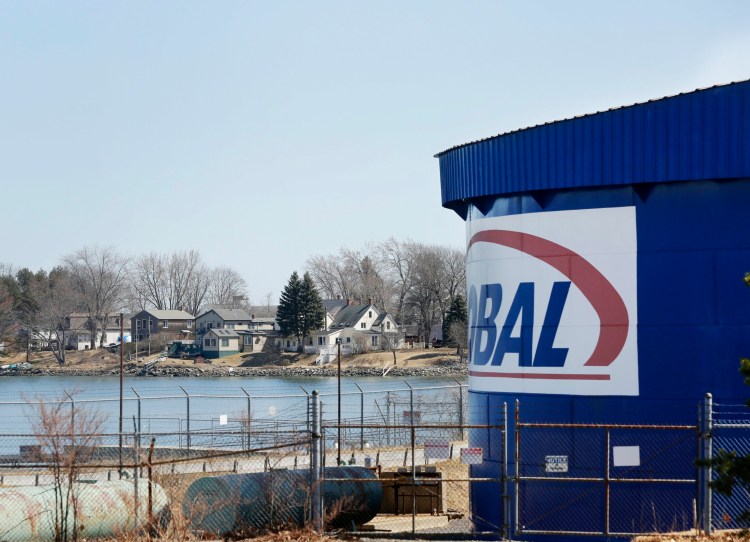SOUTH PORTLAND — State environmental officials pledged to help the city develop an air quality monitoring program that many residents called for at Tuesday’s City Council meeting focused on petroleum storage facilities.
Gerald Reid, head of the Maine Department of Environmental Protection, addressed community concerns raised by a recent federal lawsuit that charged Global Partners LP with violating the Clean Air Act at its petroleum storage facility on the Fore River.
“We know residents of South Portland have legitimate questions and concerns,” Reid said.
Reid said the DEP would help the city develop an air quality monitoring program that fits the needs of the community, possibly with assistance from Global and the U.S. Environmental Protection Agency. However, Reid said, the state agency doesn’t have the resources to develop or finance the program alone.
“DEP has been on a starvation diet for eight years,” Reid said, referring to the administration of former Gov. Paul LePage, a Republican. Reid was appointed commissioner by Gov. Janet Mills, a Democrat who won election last November on a rigorous environmental platform.
The EPA filed a lawsuit and consent decree against Global on March 25 in U.S. District Court in Portland. The city has hired Paul Driscoll and Adrian Kendall, lawyers with Norman Hanson DeTroy of Portland, to help decipher the complex lawsuit and draft the city’s response to the consent decree with the U.S. Department of Justice by May 1.
Global denies the violation and has promised to work with city officials and residents to be a good neighbor.
More than 20 residents spoke during Tuesday’s workshop. Many said the city should have been told about Global’s violations long ago, They also expressed disappointment in the consent decree, which outlines the terms of a proposed settlement that would force Global to pay $190,000 in penalties and reduce emissions at its facility.
Residents and councilors said the consent decree should require Global to upgrade its pollution control systems above “dinosaur” standards, according to Councilor Kate Lewis.
They also said Global should help pay for a citywide air quality monitoring program that wouldn’t rely on the self-reporting of petroleum companies. Several petroleum companies operate terminals in the city and have more than 100 bulk storage oil tanks.
“Our health is dependent on the fox guarding the hen house,” said Roberta Zuckerman, a leader of Protect South Portland, a local environmental group that’s circulating a petition calling for a tougher consent decree.
Reid and a DEP staff member deflected questions about the state agency’s disagreement with the EPA’s assertion that Global violated its emissions license issued by the DEP.
Jane Gilbert, who oversees the DEP’s emissions licensing program, told the council the EPA used a “very different” testing methodology and the state agency is reviewing why DEP reached a “very different” conclusion.
Reid noted that he became aware of the disagreement last summer, when DEP officials consulted with him in his previous role as head of the Natural Resources Division at the Maine Attorney General’s Office. Reid told the council the disagreement was technical and professional.
Global is a Massachusetts company that operates a petroleum storage facility off Lincoln Street, at the end of Clark Road, near Forest City Cemetery and the Pleasantdale neighborhood.
Global stores liquid asphalt and No. 6 heavy residual fuel oil in huge heated tanks that have the potential to emit more than 50 tons of VOCs into the air each year, the EPA contends in its lawsuit. That’s more than double the 21.9 tons per year allowed under an emissions license issued by the Maine DEP in 2013.
VOCs include a variety of chemicals that can produce adverse health effects such as eye, nose and throat irritation, headaches, nausea, and damage to the liver, kidneys and central nervous system, the EPA said.
VOCs also contribute to the formation of ground-level ozone. Breathing ozone can trigger a variety of health problems, particularly for children, the elderly and anyone with lung diseases such as asthma. Ground-level ozone also can harm sensitive vegetation and ecosystems..
Under the proposed settlement in South Portland, Global would pay a $40,000 fine and invest at least $150,000 in a program to replace or upgrade wood stoves in Cumberland County. The program would provide vouchers to help people replace or retrofit older wood-burning stoves with cleaner-burning, more efficient heating equipment.
Global also must apply for a revised license from the DEP and take steps to reduce VOC emissions at the facility.
Send questions/comments to the editors.


